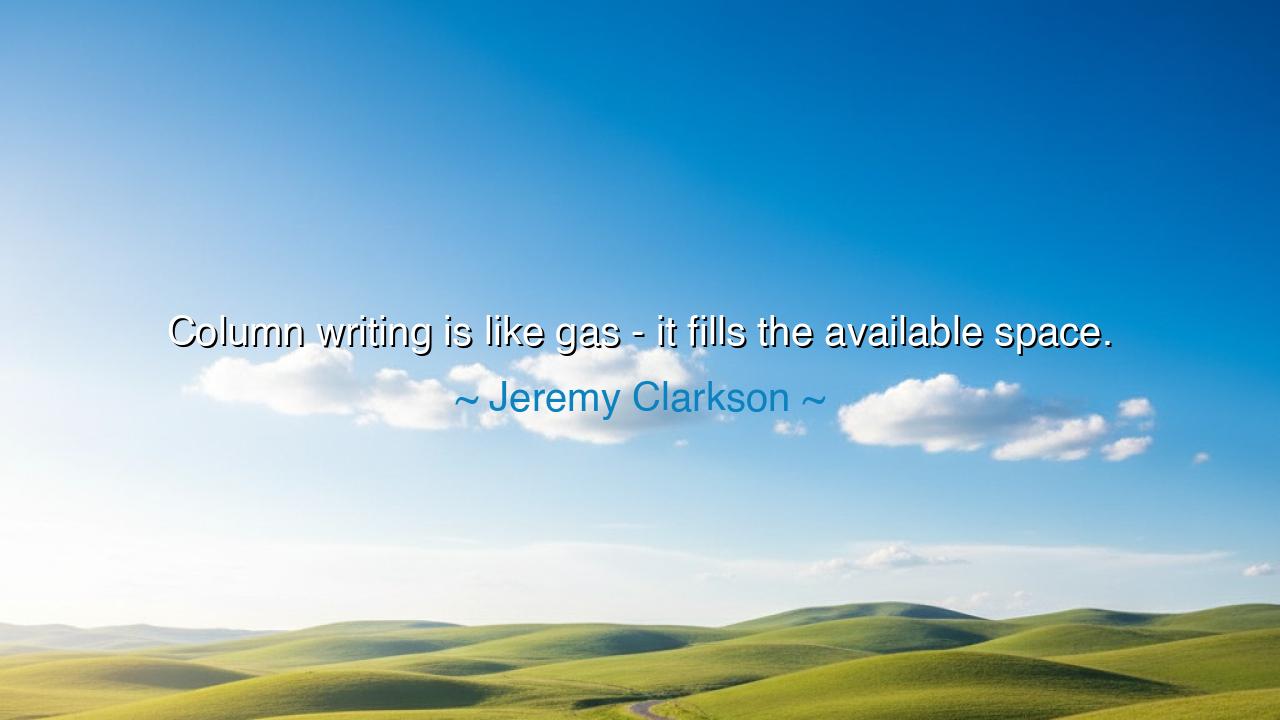
Column writing is like gas - it fills the available space.






Jeremy Clarkson, with wit sharpened like the edge of a sword, once declared: “Column writing is like gas—it fills the available space.” Though spoken in jest, these words echo with a deeper wisdom, for they reveal not only the craft of writing but the nature of expression itself. Just as gas expands without effort to fill its vessel, so too does the written word stretch to occupy the room given to it, whether vast or small. In this saying lies both humor and truth: that words, once released, will always find a way to fill the silence.
What Clarkson captures is the paradox of column writing: the writer does not begin with infinity, but with a container—a fixed length, a page, a deadline. Into that vessel the writer pours thought, story, and opinion, until the space is filled. Sometimes the thoughts are many, rushing forth like a tempest, sometimes they are few, stretched and expanded like smoke to reach the boundaries. Thus, the task of the writer is not only to express, but to shape, ensuring the gas does not become poisonous nor the words meaningless.
The ancients understood this in their own craft. Cicero, master of oratory, knew that speech, like gas, will expand to fill the time allotted in the forum. If granted but a moment, he delivered sharp sentences; if granted an hour, he poured forth torrents of rhetoric. And yet, the wise knew that true power was not in endless expansion but in control. The greatest orators measured their words as one pours wine—enough to fill the cup, but not to overflow it.
Consider also the newspapers of the last century. ors demanded their writers fill exactly so many inches of print. If the news was small, the column grew fat with description and flourish; if the news was vast, it was pressed into brevity. In this we see Clarkson’s truth proved: the writing always filled the vessel, no matter its size. This is the strength and the danger of words—that they will stretch to the frame given, whether in beauty or in excess.
The lesson, therefore, is not merely about column writing, but about life itself. Human beings, like gas, expand into the space allowed to them. Give a man little responsibility, and his energy will fill that little. Give him much, and his spirit will grow to meet it. But as with gas, the danger lies in diffusion—energy spread too thin, words stretched too far. Thus, the wise must learn not only to fill space, but to fill it with purpose.
Practical action follows: when you write, do not fear the boundaries, but honor them. Let your words expand, yes, but shape them as breath fills the lungs—not aimless, but with rhythm and life. And in your living, do the same. Take the space you are given, be it small or large, and fill it with meaning, not waste. If your day is short, make it full; if your opportunities are vast, make them purposeful. Do not mistake expansion for fulfillment.
So let Clarkson’s jest be remembered as a teaching: words are like gas, and so too is the human spirit. They will always expand to fill their vessel, but the measure of wisdom is in what they carry—fragrance or stench, clarity or smoke. Therefore, when you fill the space of your life, fill it not merely with abundance, but with excellence. For the world gives you a column of days, and you must decide how to write upon them.






AAdministratorAdministrator
Welcome, honored guests. Please leave a comment, we will respond soon